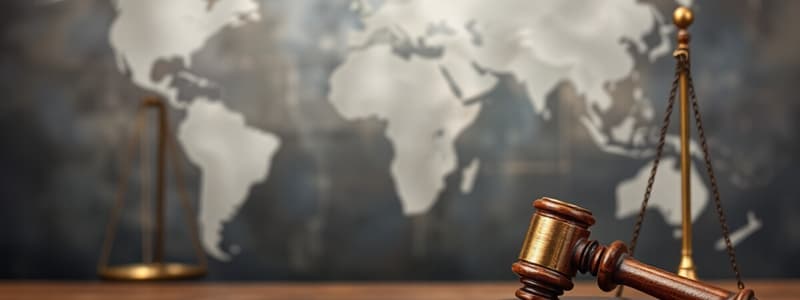Podcast
Questions and Answers
What are the two main approaches to international law?
What are the two main approaches to international law?
- Liberalism and Marxism
- Realism and Idealism
- Positivism and Naturalism (correct)
- Rationalism and Empiricism
The International Court of Justice (ICJ) can only hear cases between states.
The International Court of Justice (ICJ) can only hear cases between states.
True (A)
What is the name of the principle that holds that states are bound by customary international law even if they have not formally consented to it?
What is the name of the principle that holds that states are bound by customary international law even if they have not formally consented to it?
Opinio juris
The ______ is a principle that states that a state's laws apply only within its own territory.
The ______ is a principle that states that a state's laws apply only within its own territory.
Match the legal concept with its description:
Match the legal concept with its description:
Which case is associated with a major decision by the US Supreme Court in April 2003?
Which case is associated with a major decision by the US Supreme Court in April 2003?
The case 'Elettronica Sicula SpA (ELSI) case' involves the United States suing Canada.
The case 'Elettronica Sicula SpA (ELSI) case' involves the United States suing Canada.
What was the main issue in the 'Egyptian Workers’ Claims' case?
What was the main issue in the 'Egyptian Workers’ Claims' case?
The _____ case involved a dispute between El Salvador and Honduras over land and maritime boundaries.
The _____ case involved a dispute between El Salvador and Honduras over land and maritime boundaries.
Match the following cases with their respective descriptions:
Match the following cases with their respective descriptions:
Flashcards
Djibouti v. France
Djibouti v. France
A case reported in ICJ Reports (2008), discussing international legal principles.
Effect of Reservations
Effect of Reservations
The impact that reservations have on the enforcement of the American Convention on Human Rights.
Eichmann case
Eichmann case
A significant international law case concerning the trial of Adolf Eichmann for war crimes.
El Salvador/Honduras Dispute
El Salvador/Honduras Dispute
Signup and view all the flashcards
DPP v. Doot
DPP v. Doot
Signup and view all the flashcards
International Law
International Law
Signup and view all the flashcards
Customary International Law
Customary International Law
Signup and view all the flashcards
Human Rights
Human Rights
Signup and view all the flashcards
The Role of Force in International Law
The Role of Force in International Law
Signup and view all the flashcards
Recognition of States
Recognition of States
Signup and view all the flashcards
Study Notes
International Law: Overview
- International law governs relations between states and other entities with international legal personality.
- Its development has evolved through various historical periods, including early origins, the Middle Ages and Renaissance, the modern period through positivism and naturalism, and the impact of communist and developing country perspectives.
- The contemporary scope of international law has expanded significantly, addressing issues like human rights and environmental protection.
- Contemporary theories explore the balance between positive law (based on treaties and custom) and natural law (based on inherent principles of justice). New approaches include considering issues like fragmentation of law.
Sources of International Law
- Custom: A source of international law created through consistent state practice (material fact) and an accepted legal obligation (opinio juris). State practice includes both physical acts and declarations. Recognition, acquiescence, and protest play roles in establishing or modifying customary law. Regional and local custom also exists.
- Treaties: Written agreements between states, specifying the rights and obligations of the parties involved.
- General Principles of Law: Legal principles recognized by various national legal systems, which can apply in international law. Equity plays a part.
- Judicial Decisions: Courts can articulate and clarify the principles of international law, though they are not legally binding in the same way as treaties.
- Writers: Scholarly work and commentary contribute to the understanding and interpretation of international law.
- International Law Commission: A body established by the UN to help develop and codify international law. Other international bodies can contribute to development of law as well.
- Unilateral Acts: Actions of a state that create legal obligations for that state, assuming they are clearly intended as legally binding.
- Hierarchy of Sources/Jus Cogens: Understanding which sources take precedence. Jus cogens are fundamental principles that cannot be overridden by any treaty or custom.
International Law and Municipal Law (Domestic Law)
- International law and domestic law interact in complex ways for states.
- Municipal law often incorporates international law into its legal structures.
- Courts often deal with cases where international law affects domestic law. This can differ widely between common law (e.g., UK & US) and civil law systems.
- Doctrines like non-justiciability, act of state, and executive certificates can influence the application of international law in domestic courts.
Subjects of International Law
- States: Entities possessing rights and obligations under international law. Statehood is achieved through criteria like permanent population, defined territory, government, and capacity to enter into relations with other states. Statehood can change through recognition or extinction.
- Sui Generis Entities: Special categories of entities, such as mandated territories, condominiums, or those under international administration (ex: Germany 1945, Taiwan). Secessionist entities such as the Saharan Arab Democratic Republic or Kosovo are included as special cases.
- Associations of States: Unions or alliances of states (e.g., the UN, EU, OSCE, African Union). Entities like sovereign religious orders, the Holy See, and insurgents can also fall under this category.
- International Organisations: Entities created by treaties between states, having international legal personality.
- Individuals: Increasingly recognised as subjects of international law regarding human rights and criminal responsibility.
- Transnational Corporations: Businesses operating across state borders, impacting international law.
International Protection of Human Rights
- International human rights law establishes protections for individuals.
- Approaches to human rights vary, with different ideas about what constitutes a basic human right and how they should be addressed.
- The UN system, including political bodies and expert committees, plays a crucial role in the effort to implement specific human rights treaties. Regional organizations like the EU, Council of Europe, OAS, and AU also play key roles in human rights.
Individual Criminal Responsibility in International Law
- International criminal courts and tribunals, including the ICTY, ICTR, and ICC, aim to prosecute individuals for serious crimes under international law. Hybrid courts (e.g., Sierra Leone, Cambodia, Kosovo) and special panels are also identified.
- International crimes, such as genocide, war crimes, crimes against humanity, and aggression, are subject to specific legal definitions and prosecution criteria.
Recognition in International Law
- Recognition is a crucial aspect of creating rights and obligations under international law regarding states and governments. Recognition varies from the implied to the explicit.
- Recognition can affect a state's standing in various ways, both internationally and internally.
Territory in International Law
- Territorial sovereignty is a key principle in international law. This chapter explores how and why territory changes through various means, including treaties, accretion, cession, and effective control.
- The legal framework for acquisition of territory is complex, and sometimes involves contested claims.
Law of the Sea
- This area of international law governs activities in the oceans and seas. It includes defining territorial waters (territorial sea, internal waters, bays, islands, and archipelagos). This also dictates freedom of navigation and rights to resources like the continental shelf and exclusive economic zones. Legal aspects regarding delimitation, straits, and the high seas are explored.
Jurisdiction in International Law
- States have jurisdiction over their territory but can also exert jurisdiction over their citizens or those accused of crimes against them anywhere. The universality principle applies to certain serious crimes (e.g., genocide, war crimes, crimes against humanity).
Immunities from Jurisdiction
- States and their representatives sometimes enjoy immunity from jurisdiction in foreign courts. The distinction between sovereign and non-sovereign acts by states often influences this immunity.
- Diplomatic and consular immunity are enshrined in international law through specific conventions.
State Responsibility
- State responsibility is a principle outlining the circumstances where one state can be held responsible for actions/omissions for their officials. Attribution of responsibility for an action differs under specific situations (e.g., state control, mob violence).
- This includes the treatment of foreign nationals, property, and expropriation.
International Environmental Law
- Addresses principles of state responsibility, liability, and cooperation in dealing with environmental challenges.
Law of Treaties
- Focuses on the processes of treaty creation, including consent, reservations, entry into force.
- The chapter describes the application of, and dispute settlement over treaties. Issues of treaty validity, termination, and suspension are also explored.
State Succession
- Examines how international legal obligations are transferred when a state changes or is divided.
Settlement of Disputes
- Encompasses both diplomatic and binding means of conflict resolution, and elaborates on the role of international organizations throughout this process.
International Court of Justice (ICJ)
- Details the structure, jurisdiction (including contentious and advisory), and procedure of the ICJ.
International Law and the Use of Force
- Outlines the rules governing the use of force by states, with specific focus on self-defense and the UN Charter's role.
International Humanitarian Law
- Covers the protection of victims of armed conflicts, covering issues surrounding armed conflicts, whether international or internal.
United Nations (UN)
- Detailing the organization, functions, and structure of this international organizations.
- This chapter explores the principles and practices regarding the settlement of disputes and the collective security system of the UN, covering both measures that do and do not involve force.
International Organizations
- Generally, this chapter discusses the legal aspects, powers, and responsibilities of international organizations.
Studying That Suits You
Use AI to generate personalized quizzes and flashcards to suit your learning preferences.




